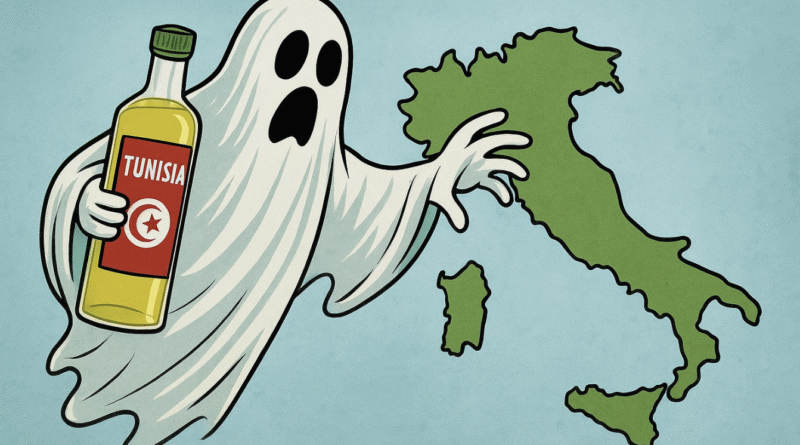Ghost olive oil from Tunisia entering Europe – immediate stop is demanded.
Lack of controls, speculative operations, an artificial drop in prices, and helpless consumers.
Preferential imports from Tunisia are not subject to the same traceability and origin requirements that European olive farmers must meet.
Urgent intervention from the European Union is called for.
In a serious complaint about the possible trafficking of “black” olive oil from Tunisia, the Spanish agricultural association COAG is calling on the European Union to intervene immediately. Its request is reproduced by the Italian website Olivonews, also citing data from the news website Olimerca. According to COAG, much of Tunisian olive oil is imported with a preferential regime (no tariffs), but without the same strict traceability required for European producers.
WHAT IS REVEALED
Quotas and lack of controls:
According to COAG, the EU allows the import of up to 56,700 tons of Tunisian olive oil annually without tariffs – a quota that is quickly being exhausted, with “few restrictions,” as the organization notes.
Impossible traceability:
This oil reaches Europe, but “it is almost never listed on the label,” COAG claims, citing an article in Olimerca (as reported by Olivonews). The result, according to the complainants, is that it can be mixed, repackaged and/or “triangulated” without the consumer knowing its true origin.
Economic risk:
COAG spokesman Francisco Elvira warns that this “double-standard” traceability system creates artificially low prices on the EU market, encouraging speculative movements and hurting European producers who follow regulations.
Political pressure and European reaction
Concern has also reached the European level. On 23 October 2025, MEP Dario Nardella submitted a formal question to the Commission, asking it to investigate reports of possible fraud in the relations between the Tunisian company Bioliva Med and the Spanish company Borges and whether the Commission intends to increase controls and transparency on imports.
What research reports and independent data show
It is not just farmers’ organisations. There are wider indications of a general risk of fraud in the EU olive oil market.
According to a report by Knowledge4Policy, the authorities in Tunisia have already identified significant cases of olive oil adulteration, raising concerns about the authenticity and quality of exported products.
From the evidence that emerges, the issue is not simply about importing cheap olive oil. The problem seems to be deeper and multifaceted:
Transparency and traceability:
The lack of Tunisian origin on labels raises serious questions about whether consumers are receiving the right information. If Tunisian oil is mixed or “triangulated”, then the olive oil market risks losing its credibility.
Economic pressure:
The collapse in Tunisian olive oil prices, according to Coldiretti, is putting significant pressure on European producers. If COAG’s accusations are true, then this is not just an economic issue but also practices that undermine fair competition.
Regulation and controls:
The intervention by MEPs shows that the issue is being seriously assessed at a political level. If controls are strengthened, the EU can impose stricter standards on imported oils, protecting producers and consumers.
Dangers and challenges
Implementing stricter traceability rules is neither easy nor quick. For controls to be effective, digitalisation, cooperation with Tunisian authorities and interoperable systems are needed.
The risk of “cheap olive oil – low cost” could lead to trade tensions between European producers and importers.
At the same time, there is a risk that consumers will lose confidence in the EU olive oil market if the complaints continue or prove to be well-founded.
Source:olivenews.gr 17 November 2025

See also (in several languages) :
https://olivonews.it/en/olio-di-oliva-fantasma-dalla-tunisia-va-subito-bloccato/


